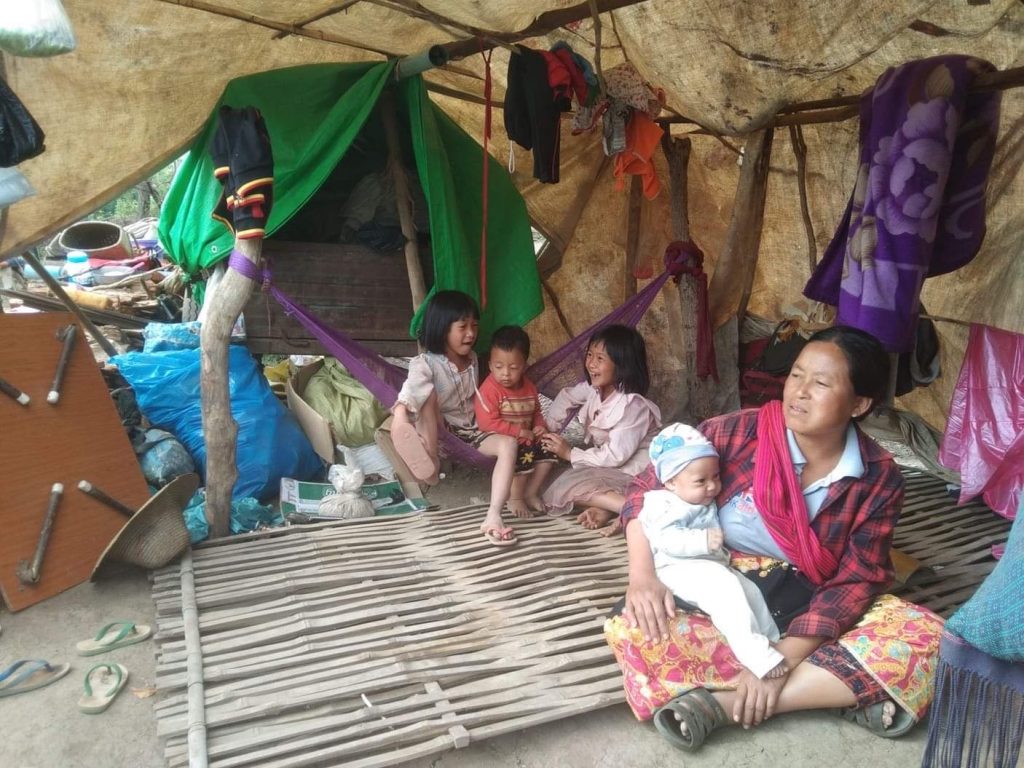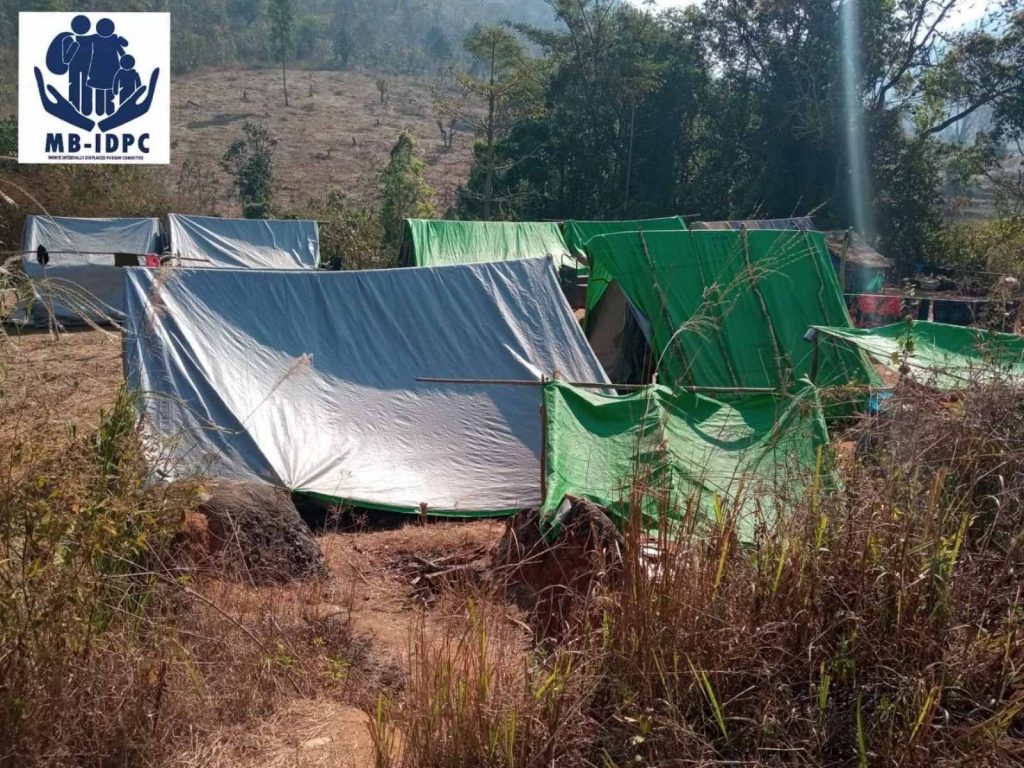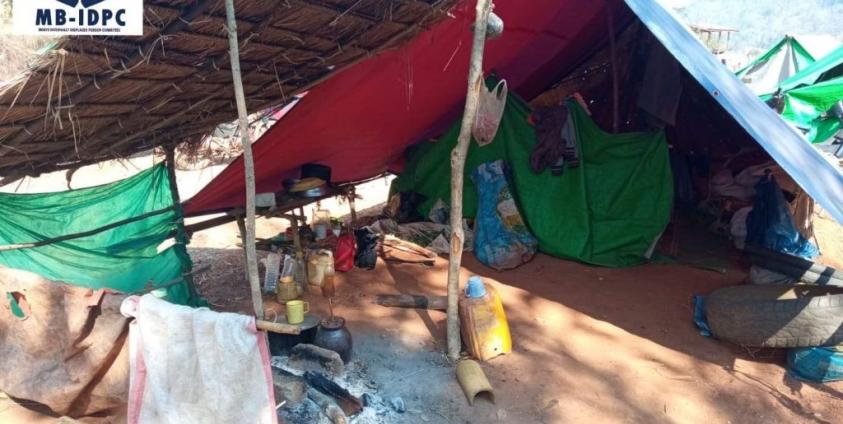A group of people are holding and carrying bags while struggling to walk on a two foot wide track in a deep forest.
Since this is the raining season, the track is very slippery and everyone is covered with mud – they are climbing one mountain after another to get to safety.
These people are internally displaced people forced to flee their homes because of the Myanmar military offensive military operations in the areas, and they are heading to somewhere safe.
The IDPs camp they are heading to is about three miles from Phaikhun township; however, there is no road in which vehicles can be used, so they travel on foot.
“There is no road for vehicles from here. We have to travel on foot. The gun fight could escalate anytime along the way. And the journey is very tough,” Mu Ae Mali, who is currently helping the IDPs, told SHAN.
Currently, about 700 IDPs are in the jungle trying to seek safety. They are from the villages in the eastern part of Phaikhun township, Southern Shan State.

The temporary shelters built in the jungle are not strong enough to withstand the strong wind and rain, and they are often blown away.
“They have to build temporary shelters with plastic cover. The plastic cover is not enough for everyone – they could only bring the old ones they have. So, it could not totally protect them from the rain. It is getting worse when it is windy – they are usually blown away. The main concern is for the children and elderly people because these groups of people are sensitive and the situation is not good for their health,” Mu Ae Mali continued telling the IDPs situation.
On one hand, the people are worried about the Myanmar military junta attack in the villages, and they flee into the forest; on the other hand, it is very hard for them to travel and survive because of shortage of supplies and difficulties to travel.
“There is no transportation route to go there to support them with food and supplies. So, we have to go there by foot which makes it difficult for supporters,” Mu Ae Mali who used to go to the camp in the jungle explained about the problems.
Currently, there are almost no supporters to provide food and supplies. Moreover, there is neither mobile phone signal nor internet connection in that IDPs camp area.
During this month, the armed conflict broke out between the Myanmar military junta and local people defense force (PDF) in the eastern part of Phaikhun township. The military used air strikes to attack the PDF, and burned down a whole village in Saung Nan Kae village.

Moreover, the Myanmar military junta has set up a base on the route that the IDPs are using, and gun fights could escalate anytime. That is the reason those IDPs in the jungle cannot return home yet.
“It is not safe anymore to seek cover in their farms, they have to flee into the deep jungle. Additionally, fights could escalate anytime along the way through the jungle. They are trapped in the jungle,” Mu Ae Mali quoted.
Since this is the rainy season, health care is another pressing concern for the IDPs.
“Diarrhea is very common during the rainy season. Moreover, lots of mosquitoes are in the jungle; therefore, dengue fever is another concern. Women are even in a more difficult situation. Overall, nothing is convenient during this rainy season,” Mu Ae Mali explained about the difficulties.
Totally around 1,300 IDPs from eastern Phaikhun township are now taking refuge in Moebye township.
“Most of the IDPs are children and elderly people, very few adults and young people are in the camp. Those young people are working and earning somewhere else. Children are almost at every IDPs camp,” U Yan (Not real name), a committee member of the Moebye IDPs, told SHAN.
U Yan also added that most of the IDPs are children, women, and elders, and children do not have a chance to study yet.
“Many children are at the IDPs camp – they are at almost every camp. Some of them are 6 to 8 years old and they still do not have a chance to study yet. Some are 7 years old and they have never been to kindergarten yet. So, if we look at education, it is getting worse and worse,” U Yan disappointedly told SHAN.
Moreover, agriculture is the main career in Phaikhun township, and the locals can no longer work on the farms due to the armed conflicts after the coup in February 2021.
U Yan has expressed his worries that the productivity of paddy could significantly decrease this year, and if the locals still have to flee next year, there will be zero paddy productivity next year.
“Only one third of the farms are cultivated this year in Moebye; therefore, there could be a shortage of paddy next year. Paddy is the main agricultural product east and south of Moebye, and people can no longer work on the farms in those areas. People do not dare to do so,” U Yan added.
Moebye town, Phaikhun township, is the first town to establish a people defense force (PDF) and fight against the military junta three months after the coup.
Since then the armed conflict between the PDF and Myanmar military junta have been intensely ongoing, and air strikes and artillery shelling have been used against the local PDF.
According to one PDF member from eastern Phaikhun township, Myanmar military could reinforce more deployments into the areas and the gun fight could become heavier.
“The clash will be ongoing, and it could become worse and worse. They (the military) are using more weaponry including the air strike and big shelling,” the above PDF member who is based in eastern Phaikhun township told SHAN.
Therefore, if the gun fight continues and gets worse, there will be more internally displaced people and it will be difficult to manage their food and supplies. If the military is continuously using air strikes, it will be difficult for the IDPs to relocate.
“If the war continues, and if the military continues bombarding using air strikes, it will not be safe for the IDPs even if they relocate to the deep jungle. There will be no place for them to run to,” Mu Ae Mali pointed out the future scenario for the IDPs.







